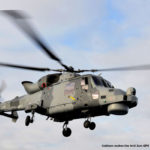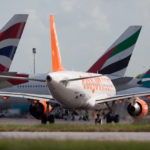In today’s update, the Airport Operators Association and IATA make another call for specialist aid for the sector, Dubai throws Emirates a lifeline, the UK government signs an MOU with grounded carriers to operate repatriation flights and Virgin Australia donates toilet roll from its grounded flights to vulnerable Australians.
AOA calls on government to provide specialist aid for airports
The UK’s airport industry body is calling for government assistance after a massive drop in revenue.
Airports are calling for government assistance after revenues fell to almost nothing, according to the Airport Operators Association.
Karen Dee, chief executive of the Airport Operators Association, said although commercial demand had dried up due to government restrictions on non essential travel, airports still have to stay open for medical, military and freight flights. London Gatwick Airport closed its North Terminal yesterday for at least one month and London City Airport suspended its operations to all commercial flights last week, although will be in use by the RAF to transfer patients to the nearby NHS Nightingale Hospital which is currently being built at the nearby ExCeL exhibition centre.
Dee said the government’s furlough scheme would only provide limited relief for the UK’s airports as staff were needed to operate the airports. As airports were safety critical businesses, she said 70-80 per cent of running costs were fixed, no matter how many flights were landing.
Dee called on the government to review support schemes and offer targeted support to “better suit the airports needs.”
IATA warns airlines likely to post net loss of $39 billion in Q2
Analysis by the International Air Transport Association (IATA) Airlines reports that airlines are likely to burn through $61 billion of their cash reserves during the second quarter ending 30 June 2020 and post a quarterly net loss of $39 billion.
The figures are based on an impact assessment by IATA using a scenario in which severe travel restrictions were put in place for three months. IATA warned the impact of the restrictions will lead to a drastic slide in full-year demand, down 38 per cent while full-year passenger revenues may freefall by $252 billion compared to 2019. The drop off in demand is forecast to be the deepest in the second quarter, with a 71 per cent drop.
Revenues have dropped by 68 per cent, but this is less than the expected 71 per cent fall in demand due to the continuation of cargo operations with reduced levels of activity. The analysis predicts variable costs will drop sharply by almost 70 per cent in the second quarter, which is in line with the reduction of an expected 65 per cent cut in second quarter capacity. The price of jet fuel has also fallen sharply, but IATA estimates that fuel hedging will limit the benefit to a 31 per cent decline.
Fixed and semi-fixed costs make up 50 per cent of airline cost base
IATA says the industry has been hit as fixed and semi-fixed costs amount to nearly half an airline’s cost. “We expect semi-fixed costs (including crew costs) to be reduced by a third. Airlines are cutting what they can, while trying to preserve their workforce and businesses for the future recovery. These changes to revenues and costs result in an estimated net loss of $39 billion in the second quarter.”
Airlines are also faced with refunding sold but unused tickets as a result of massive cancellations resulting from government-imposed restrictions on travel on top of fixed costs, with a second quarter liability estimated at $35 billion. Airlines are expected to burn through $61 billion of their cash balances in the second quarter.
Alexandre de Juniac, IATA’s director general and CEO, said: “Airlines cannot cut costs fast enough to stay ahead of the impact of this crisis. We are looking at a devastating net loss of $39 billion in the second quarter. The impact of that on cash burn will be amplified by a $35 billion liability for potential ticket refunds. Without relief, the industry’s cash position could deteriorate by $61 billion in the second quarter.”
De Juniac said several governments were responding positively for the industry’s need for relief measures including Colombia, the United States, Singapore, Australia, China, New Zealand and Norway. Countries including Brazil, Canada, Colombia, and the Netherlands have relaxed regulations, allowing airlines to offer passengers travel vouchers in place of refunds.
UK government to spend £75m on repatriation flights
The UK government is to spend up to £75 million ($93 million) to repatriate its citizens with the assistance of easyJet, Jet2.com, Titan Airways and Virgin Atlantic.
Foreign Secretary Dominic Raab said the UK government would “work non-stop around the world” to keep air routes and critical transit hubs open, enabling British residents to return to the UK.
The government has signed a memorandum of understanding with easyJet, Jet2.com, Titan Airways and Virgin Atlantic to bring tens of thousands of stranded Britons home on charter flights which will cost up to £75m.
Raab said: “We’ve already worked with airlines and governments to enable hundreds of thousands to return home on commercial flights, and we will keep as many of those options open as possible. Where no commercial passenger routes exist, the government plans to provide up to £75 million ($93 million) to help “tens of thousands” of stranded Britons return home on chartered flights.”
Earlier charter flights have been organised, flying Britons back from China, Japan, Cuba, Ghana and Peru. The move comes under the government was put under mounting pressure from Britons stuck abroad for not acting swiftly enough to repatriate its citizens.
Charter flights are already up and running to Ghana and Tunisia, according to the government, with more countries including India and South Africa to be added this week. Commercial routes to these destinations have been suspended, leaving British travellers stuck overseas.
The flights will be prioritised according to the number of stranded British citizens, their vulnerability and local health provision.
Dubai throws lifeline to Emirates
Dubai is to give an undisclosed sum to Emirates to prop up the airline in a move which has been welcomed by IATA.
Praising the move, IATA’s Director-General and CEO Alexandre de Juniac said: “Dubai recognised the importance of the carrier [Emirates] to the wellbeing of the economy of the UAE.
“We think this is what governments should do as an approach [to help the airlines]. It is a key asset for any country to have a strong airline industry.”
Shaikh Hamdan Bin Mohammed Bin Rashid Al Maktoum, Crown Prince of Dubai, outlined the move in a Twitter post yesterday, He said that the government renews its “commitment to support a success story that started in the mid-1980s to reach its goal of sitting on the throne of global aviation.”
He added: “The Government of Dubai is committed to fully supporting Emirates at this critical time and will inject equity into the company.”
Shaikh Hamdan said the details of the equity injection, along with other measures, will be announced soon.
Virgin Australia donates toilet paper rolls to those in need
Virgin Australia grounded 125 of its aircraft last week and cut domestic travel by 90 per cent.
The airline is now set to donate toilet rolls from the grounded flights to vulnerable Australians. The rolls will be distributed through community partners such as The Salvation Army.

